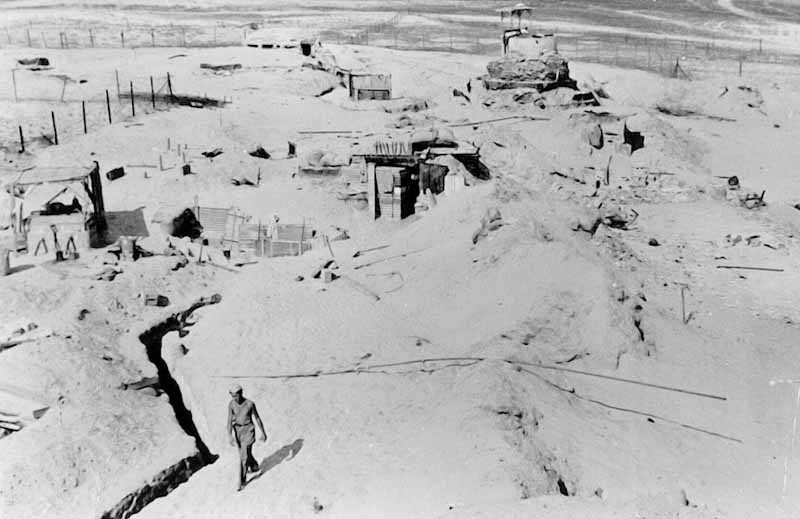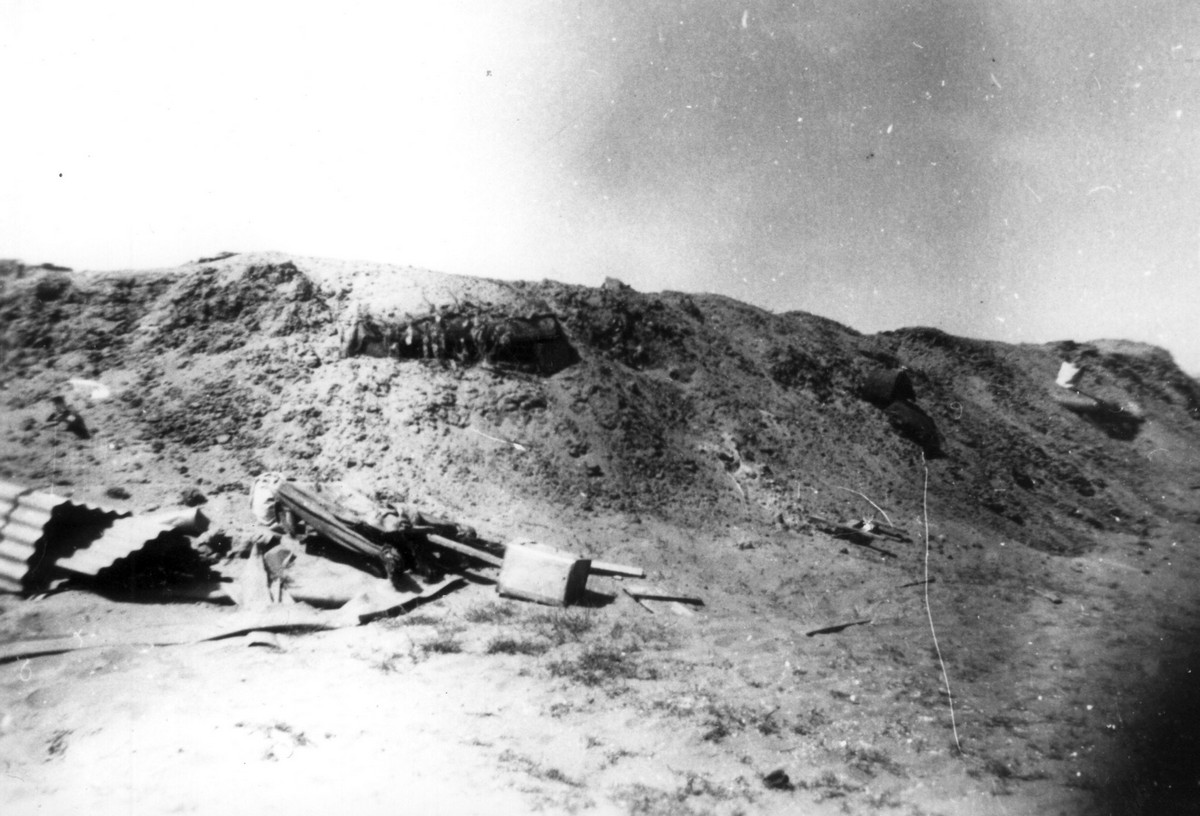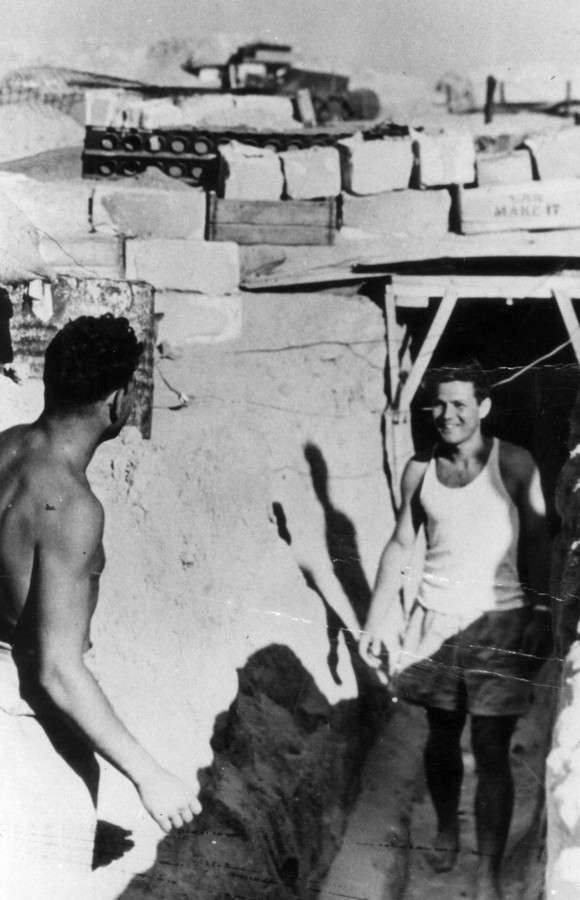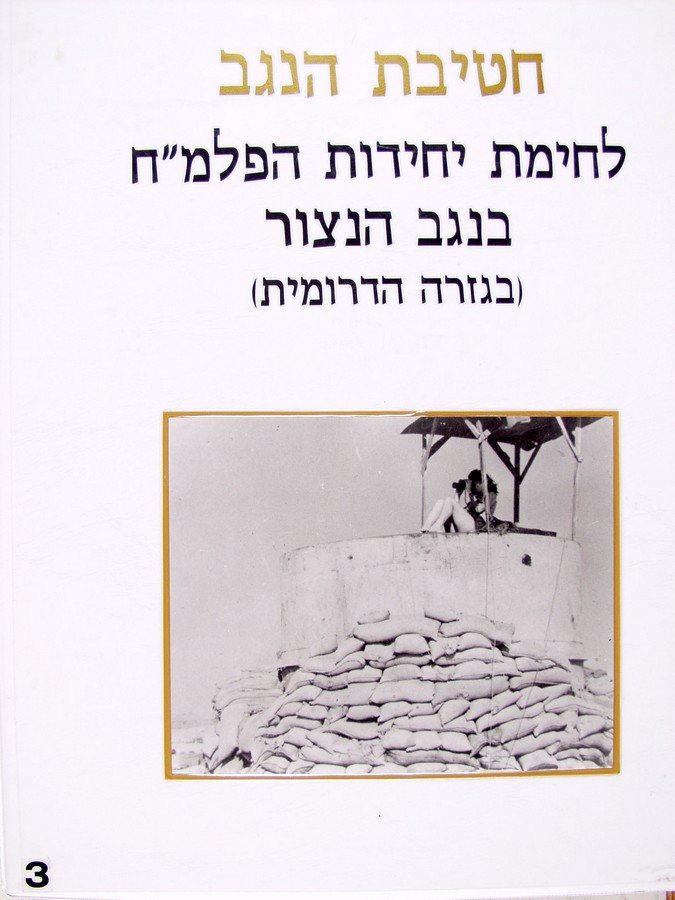The steadfast stand of Kibbutz Nirim in face of the Egyptian attack
The first Jewish settlement to be attacked by the Egyptian invaders was kibbutz Nirim. The settlement was defended by 45 fighters (men and women) who were equipment with light arms only. One third of the fighters were killed or wounded. The steadfast stand of the settlement in the face of the attack by a regular army with armored vehicles and heavy guns, confirmed the slogan that decorated the dining room in Nirim where it was written: "Only man will prevail – not tanks."
The Negev Brigade - 3
A group of members from kibbutz Nirim in Rishon Letzion area, founded one of the 11 kibbutzim that were established in the Negev on 6.10.1946.
Kibbutz Nirim was founded on the Dangur lands, 6 kilometers from the Rafiah – Han Yunis road.
The settlement was defended by about 45 fighters, some of whom had been in the Palmach and others who had grown up in the Youth Aliya groups.
The fighters were equipped with rifles, sten-guns, 2 machine guns, a 2" (52 mm.) mortar and a 'Fiat' that shoots a hollow anti-tank shell with a range of 80 meters.)
The settlement fortifications, in relation to other places, were reasonably good. In addition to the standard four fortified positions and a shelter, there were a communications shelter, a medical shelter, snipers' positions covered and camouflaged with peripheral ramparts, a 'Piat' position outside of the fence and of course, trenches that connected all the positions and shelters.
The invasion of the Egyptian army on the 15.5.1948, opened with an attack on Nirim with hundreds of infantry-men supported by armored vehicles and heavy artillery. The attack began at 7:00 am with a heavy artillery barrage from the field guns and mortars of the artillery regiment in addition to bombings from the air. The settlement area was covered with thick smoke, the security room was riddled with bullets like a sieve, the wooden huts collapsed while burning. Miraculously, one wall of the dining room remained standing and on it was the May 1st.slogan: "Only man will prevail – not tanks."
One third of the fighters were casualties from that attack: Seven fighters were killed, amongst them the commander and the lieutenant commander of the settlement and six were badly wounded. All contact with the kibbutz was severed and then renewed repeatedly while the antennae were being repaired under fire.
While the Egyptian ground forces advanced in a broad arc, covering each other, from a distance of 400 meters, the defenders held their fire. When the enemy approached to 150 meters from the fences while some of them had crawled as far as the fence, the defenders opened heavy fire that effectively arrested the enemy advance. The Egyptian commanders ran around whistling at their troops but they were unable to renew their attack.
At a distance of 6 kilometers from Nirim, a company from the 8th regiment of the Palmach had gathered. Ten of their men had been equipped, each with one kilogram of explosives, disguised as Arabs. Their mission was to approach the Egyptian forces and to mix in with the soldiers and throw the explosives onto the enemy armored vehicles. While they were on their way, there was a change in plan and they were redirected to Nirim as a reinforcement. As they approached the kibbutz from the south, the kibbutz defenders began to fire on them. With great difficulty after much waving of arms and shouting, they joined the defenders as an important reinforcement. In the afternoon the attack was broken and the Egyptians began to retreat.
In the evening a Palmach company arrived with a doctor and all the wounded were evacuated to kibbutz Gvulot. With the help of the company they repaired the fences and laid shoe-mines; while doing so the company demolitions expert was killed. They repaired the fences and reinforced the damaged positions and also collected the arms from 35 bodies of Egyptian soldiers who had been abandoned in the battle field.
A sad ceremony was held as the fallen defenders were buried together in a common grave.
The Palmach company left Nirim before dawn.
On that evening, telegrams were radioed between the two sections of the kibbutz:
To Nirim in Rishon Letzion – "This morning we were attacked by large Egyptian forces. The bombardment from their artillery and tanks continued for 12 hours. We repelled their attack. We took much booty. There are 35 bodies of Egyptian soldiers lying in the field outside. Everything is destroyed. Seven of our friends were killed: Dudu, Bezalel, Yossi, Efraim, Zvi, Rivka and Giora. Our spirit is strong. We have food. They sent us clothes and Palmachniks."
To Nirim in the Negev: "We are pained and stunned to receive the news about the dastardly attack on our enterprise. All of our thoughts are with our home that we have sworn to raise from its ruins with all our strength and to the best of our abilities. The convoy that is to leave tomorrow from Rechovot, will bring five members and some clothing to you, and the following convoy will bring even more reinforcements. We are proud of your spirit and steadfast stand against the armored invasion. You were the first to stand up victoriously against them. Be strong and of good courage until victory!!"
The Egyptian army that failed in its attack on Nirim, established an army stronghold five kilometers from Nirim and they continued, from time to time, to harass the kibbutz with artillery fire of varied intensity, for months. The principal activity of the members was fortifying themselves. Nirim became a sophisticated underground army/kibbutz stronghold. The positions were reinforced and the shelters that were used for living purposes were improved and reinforced. The clothing center and dining room were set up underground.
The new commander of the Nirim stronghold wrote an article in the kibbutz journal published on the first anniversary of the Egyptian attack, on the morale of the kibbutz members:
"We were rewarded for our work when a 25 pound bomb exploded on the roof of the shelter without causing any damage. We felt victorious at the inauguration of our underground dining-room where all the members were able to eat undisturbed in the midst of heavy shelling. We felt victorious when the members were able to enjoy a plentiful supply of water underground. We felt victorious when a set of mirrors was installed reflecting sunlight into the shelters and we were even more elated when this contraption was installed, automatically powered by water with the mirror following the sun throughout the day from sunrise to sunset!"
Kibbutz Nirim was founded on the Dangur lands, 6 kilometers from the Rafiah – Han Yunis road.
The settlement was defended by about 45 fighters, some of whom had been in the Palmach and others who had grown up in the Youth Aliya groups.
The fighters were equipped with rifles, sten-guns, 2 machine guns, a 2" (52 mm.) mortar and a 'Fiat' that shoots a hollow anti-tank shell with a range of 80 meters.)
The settlement fortifications, in relation to other places, were reasonably good. In addition to the standard four fortified positions and a shelter, there were a communications shelter, a medical shelter, snipers' positions covered and camouflaged with peripheral ramparts, a 'Piat' position outside of the fence and of course, trenches that connected all the positions and shelters.
The invasion of the Egyptian army on the 15.5.1948, opened with an attack on Nirim with hundreds of infantry-men supported by armored vehicles and heavy artillery. The attack began at 7:00 am with a heavy artillery barrage from the field guns and mortars of the artillery regiment in addition to bombings from the air. The settlement area was covered with thick smoke, the security room was riddled with bullets like a sieve, the wooden huts collapsed while burning. Miraculously, one wall of the dining room remained standing and on it was the May 1st.slogan: "Only man will prevail – not tanks."
One third of the fighters were casualties from that attack: Seven fighters were killed, amongst them the commander and the lieutenant commander of the settlement and six were badly wounded. All contact with the kibbutz was severed and then renewed repeatedly while the antennae were being repaired under fire.
While the Egyptian ground forces advanced in a broad arc, covering each other, from a distance of 400 meters, the defenders held their fire. When the enemy approached to 150 meters from the fences while some of them had crawled as far as the fence, the defenders opened heavy fire that effectively arrested the enemy advance. The Egyptian commanders ran around whistling at their troops but they were unable to renew their attack.
At a distance of 6 kilometers from Nirim, a company from the 8th regiment of the Palmach had gathered. Ten of their men had been equipped, each with one kilogram of explosives, disguised as Arabs. Their mission was to approach the Egyptian forces and to mix in with the soldiers and throw the explosives onto the enemy armored vehicles. While they were on their way, there was a change in plan and they were redirected to Nirim as a reinforcement. As they approached the kibbutz from the south, the kibbutz defenders began to fire on them. With great difficulty after much waving of arms and shouting, they joined the defenders as an important reinforcement. In the afternoon the attack was broken and the Egyptians began to retreat.
In the evening a Palmach company arrived with a doctor and all the wounded were evacuated to kibbutz Gvulot. With the help of the company they repaired the fences and laid shoe-mines; while doing so the company demolitions expert was killed. They repaired the fences and reinforced the damaged positions and also collected the arms from 35 bodies of Egyptian soldiers who had been abandoned in the battle field.
A sad ceremony was held as the fallen defenders were buried together in a common grave.
The Palmach company left Nirim before dawn.
On that evening, telegrams were radioed between the two sections of the kibbutz:
To Nirim in Rishon Letzion – "This morning we were attacked by large Egyptian forces. The bombardment from their artillery and tanks continued for 12 hours. We repelled their attack. We took much booty. There are 35 bodies of Egyptian soldiers lying in the field outside. Everything is destroyed. Seven of our friends were killed: Dudu, Bezalel, Yossi, Efraim, Zvi, Rivka and Giora. Our spirit is strong. We have food. They sent us clothes and Palmachniks."
To Nirim in the Negev: "We are pained and stunned to receive the news about the dastardly attack on our enterprise. All of our thoughts are with our home that we have sworn to raise from its ruins with all our strength and to the best of our abilities. The convoy that is to leave tomorrow from Rechovot, will bring five members and some clothing to you, and the following convoy will bring even more reinforcements. We are proud of your spirit and steadfast stand against the armored invasion. You were the first to stand up victoriously against them. Be strong and of good courage until victory!!"
The Egyptian army that failed in its attack on Nirim, established an army stronghold five kilometers from Nirim and they continued, from time to time, to harass the kibbutz with artillery fire of varied intensity, for months. The principal activity of the members was fortifying themselves. Nirim became a sophisticated underground army/kibbutz stronghold. The positions were reinforced and the shelters that were used for living purposes were improved and reinforced. The clothing center and dining room were set up underground.
The new commander of the Nirim stronghold wrote an article in the kibbutz journal published on the first anniversary of the Egyptian attack, on the morale of the kibbutz members:
"We were rewarded for our work when a 25 pound bomb exploded on the roof of the shelter without causing any damage. We felt victorious at the inauguration of our underground dining-room where all the members were able to eat undisturbed in the midst of heavy shelling. We felt victorious when the members were able to enjoy a plentiful supply of water underground. We felt victorious when a set of mirrors was installed reflecting sunlight into the shelters and we were even more elated when this contraption was installed, automatically powered by water with the mirror following the sun throughout the day from sunrise to sunset!"






























